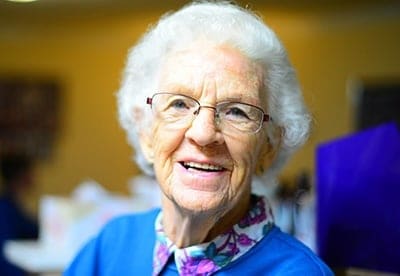 Nursing homes and “senior living centers” are growing, as the aging Baby Boomer generation begins to seek out assisted-living facilities designed to provide medical and personal care.
Nursing homes and “senior living centers” are growing, as the aging Baby Boomer generation begins to seek out assisted-living facilities designed to provide medical and personal care.
When we move an elderly or infirm loved one into a nursing home facility, we are putting an incredible trust in the facility to provide that person with physical safety and emotional as well as physical care.
The idea of your loved one being injured or sickened as a result of elder abuse in nursing homes may feel like a total betrayal of your trust.
Elder abuse and nursing home neglect are increasingly in the news these days, and we understand that you may be wondering, what should you do if your elderly parent is injured in a nursing home. Today, we’ll take a look at types of abuse and what steps you should take if you begin to suspect your elderly loved one is being abused.
What’s the Difference Between Nursing Home Abuse and Nursing Home Neglect?
The difference between abuse and neglect in a nursing home facility is largely one of intent.
Many assisted-living and nursing home facilities are chronically understaffed. Staffers working very long hours who are scrambling to keep up with the needs of residents can lead to unintentional mistakes or neglect. This could result in your elderly or inform loved one being injured or sickened.
On the other hand, sometimes staff members intentionally cause injury or illness in elderly residents — unreasonable confinement, physical or psychological intimidation, infliction of physical injuries, or even sexual abuse are all manifestations of purposeful abuse.
In short — neglect largely involves indifference or not acting within the nursing home employee’s responsibility to the patient, while abuse is purposeful and enacted explicitly to injure the resident, whether physically or psychologically.
What About Medical Malpractice in Nursing Homes?
One of the benefits of a nursing home environment is often that medical staff (nurses, physicians, physical therapists, etc) are often on-hand. These professionals are able to perform certain medical procedures, physical therapy, or other medical care without the resident having to leave their living space.
This can be comforting and helpful, especially to elderly residents for whom leaving may involve potentially harmful physical stress.
However, if the medical staff fails to act under the standard of care as defined by medical malpractice laws, this medical malpractice could result in serious injury.
Is Financial Abuse of Elders an “Injury”?
There is one form of elder abuse that we have not really gone into in detail in our former posts on elder abuse and how to spot the signs of nursing home neglect.
Financial abuse of elders occurs when nursing home employees use the financial information of residents for their own purposes.
This may include outright theft of credit, debit cards, or checking information, or it may involve the employee convincing or tricking the resident into spending their own money in ways that benefit the employee or nursing home but not the resident.
This form of abuse is insidious, and sometimes concerned relatives may not be able to prove financial exploitation of the elderly person is occurring until thousands or even hundreds of thousands of dollars have been lost to scams or abuse, as in this case from North Carolina.
Signs of Nursing Home Injuries or Elder Abuse
We’ve previously listed symptoms of nursing home neglect. However, with nursing home malpractice, intentional elder abuse, and financial abuse, symptoms may not necessarily be obvious or easy to keep track of
We cannot recommend enough how essential it is to listen to your instincts. If something feels or looks “off” in the nursing home’s treatment of your parent or loved one, it is worth taking a closer look. Your most valuable asset if you suspect elder abuse is your intuition.
Signs of Nursing Home Abuse and Neglect include, but are not limited to:
- Unexplained bruises, broken bones, or other physical injuries
- Rashes or scrapes on the ankles, wrists, or other areas commonly used to restrain patients
- Sudden weight loss that cannot be explained by disease or previously existing infirmity
- Repetitive rocking, mumbling, or nonsensical speech that begins suddenly
- Signs of depression
- Withdrawal from family members or loved ones, showing a lack of interest in communication
- Signs of fear when in the presence of nursing home employees or medical staff
- Sudden change in hygiene, especially in your relative previously kept to high standards of personal hygiene and then stops
- Missing checkbooks or unexplained financial loss/new loans in the resident’s name
- A sudden romantic fixation on specific employees, or signs of a burgeoning friendship or romantic relationship that involves your elderly relative spending money on the employee
- Unexplained disappearances of jewelry, money, or other valuable items that belong to your parent or loved one
If you notice any or all of these symptoms and suspect nursing home abuse is occurring, please seek legal representation immediately.
What Should You Do If Your Elderly Parent is Abused in a Nursing Home?
The first step should be to document the symptoms you have noticed and seek medical treatment, outside the facility if necessary.
Take photos of any visible physical symptoms, such as bruises, cuts, or marks from restraints. If your parent is able to document their treatment in writing, have them write a statement that lists everything they’ve undergone while in the facility. When you see a doctor or other medical professional, have them make copies of any and all documentation of the injuries, including diagnoses, treatment plans, and prescriptions.
If you suspect abuse or neglect from the medical professional within the facility, seek outside medical care.
Ask the nursing home for copies of their own medical treatment documents, daily reports, or anything else you can gain that will help create a more complete picture of your relative’s day-to-day.
You may not be able to catch the abuse in the moment, but if you can document the aftermath, this will help you when bringing a personal injury case on behalf of your relative.
If you suspect financial abuse, look into whether you or another trusted person can be given power over your elderly relative’s financial accounts, so any withdrawals would have to be cleared by a trusted third-party before they can occur. The bank should be able to provide your relative with statements and proof of any inappropriate withdrawals or loans that have occurred.
Speak with nursing home staff about your concerns. Sometimes, ongoing elder abuse can be traced back to a single employee, and so the abuse can be stopped if that employee is handled. Your legal representative may want to pursue financial compensation for the cost of medical treatment for the abuse, as well.
Even if the nursing home promises to change things, continue your documentation and plan to consult with a legal representative. While it would of course be wonderful to have the abuse simply stop and never reoccur, it may be not a single employee who is committing the abuse or neglect and your relative may become even more vulnerable afterward.
You may even want to consider moving your elderly relative to a different nursing home facility, to regain a sense of trust and peace of mind within your family.
Schedule a Legal Consultation for Elder Abuse
BNTD Law has a personal injury team with experience in many different areas of personal injury, including elder abuse, dog bites, wrongful death, wrecks involving tractor trailers, and more. Reach us by phone at (803) 779-7599 or contact us online at any time to request your free consultation on elder abuse in Columbia, SC.



